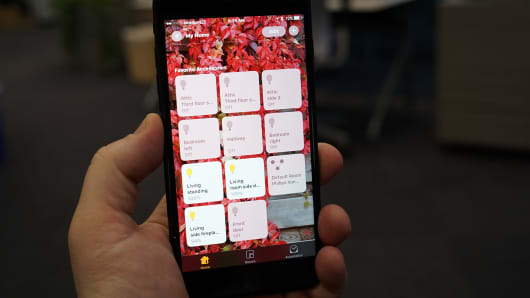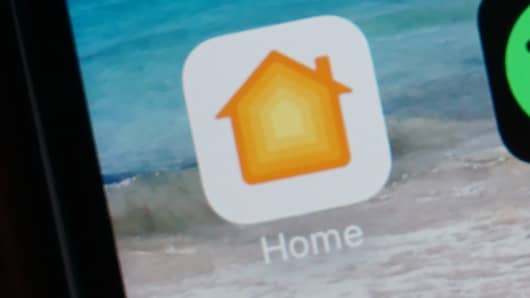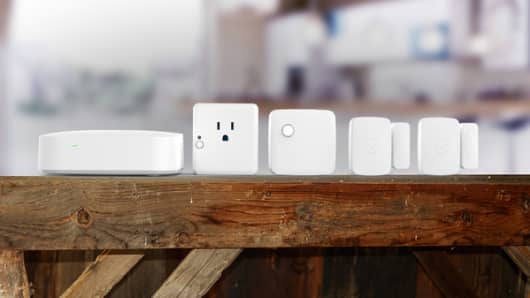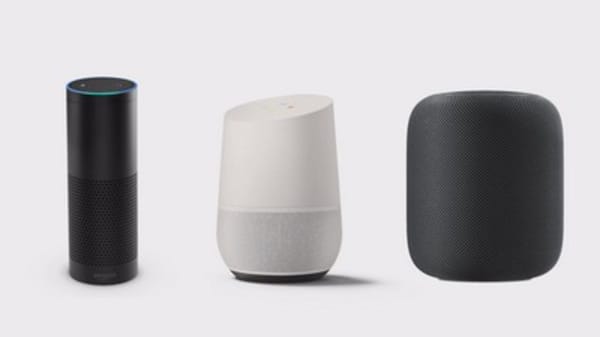Homes are getting smarter, but they're still awfully, awfully dumb.
I spent three hours yesterday trying to get a set of light bulbs to work with a Samsung Connect Hub, one of the company's new mesh-networking smart home hub combo-systems.
I do this for a living, it shouldn't be that hard for me, let alone a regular consumer who wants to control a set of bulbs from his or her smartphone.
I was excited to give Samsung's new system a try. I usually use Apple Home products, but my wife is an Android user and this seemed to be a good compromise, allowing us both to control all of the smart gadgets throughout our home from the smartphone of our choice.
Plus, I found that Samsung's Connect Hub, which also offers mesh networking to cover the house in Wi-Fi, performs about as well as Google Wifi, which I recently reviewed. Samsung's solution is a hub and a Wi-Fi mesh network in one.
As I ran around the house trying to get different gadgets working with the system (because this is what I do for fun after work), I realized that we're still a long way away from a true "smart home."
I'm an expert, I swear!
I consider myself an expert in setting up smart gadgets. I spend my free time walking around Best Buy thinking of new toys to buy to smarten up the house.
I have not one but two robotic vacuums (OK, one is a review unit), and have most of my lights connected to my smartphone. I have several Amazon Echos, two Google Homes and enough connected cameras that you'd think I'm paranoid.
Sometimes I feel like I'm turning into Wayne Szalinkski from Honey, I Shrunk the Kids, though at least he built all of his smart products by hand.
There are competing standards...
Here's the problem: Most of these gadgets don't want to work with one another, or with the hub that's supposed to connect everything.
A smart camera approved to work with Apple Home often won't work with a Samsung SmartThings hub. Same goes for smart smoke alarms, thermostats, flood detectors, door locks and other items. Once you begin to invest in one platform, spending hundreds or thousands of dollars on these connected products, you should expect to be in it for the long haul. How do you choose which one to go with? It's almost like the VHS vs. Betamax wars.
There are a few products that work across platform, however, so I'll tip my hat to one.
Philips has been particularly good at getting its Hue light bulbs to work with nearly every solution under the sun – you can control those bulbs from an iPhone, an Android device, an Amazon Echo or a Google Home. They work with HomeKit but, as I discovered last night, have some issues with Samsung's new Connect Hub system (I'm still working with Samsung to fix those kinks.)
...but we need one standard
We need one single standard that works for everything. Unfortunately, that won't happen. That means the landscape currently looks like this:
SmartThings, now owned by Samsung, is the closest to getting us to a one-system-to-rule-them-all solution, since it supports Windows, iOS and Android. There are tons of gadgets to choose from, though adding them isn't always as easy as it is on other platforms.
Apple Home works much better, is far easier to add products to and has, it seems, higher security standards for the devices it approves. It's just a shame it doesn't work with Android, or I'd empty my bank outfitting my house with Apple Home devices.
Finally, there are the far more expensive options custom created for entire homes. These were the original smart home systems and, while they may save you a headache, they often cost thousands (or tens of thousands) of dollars and require professional setup.
Until we get a single standard — and we probably won't ever — we're stuck in a tornado of connected doo-hickeys that, unless you're dead set on using Apple Home or Samsung SmartThings for the rest of your life, end up causing more of a headache than a real "smart home" solution.









